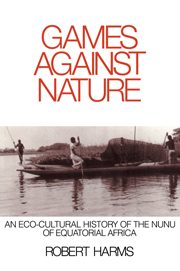Book contents
- Frontmatter
- Contents
- List of Maps
- Preface
- Preface for the paperback edition
- 1 Introduction
- 2 The Antecedents
- 3 The Tactics
- 4 The Strategies
- 5 The Drylands
- 6 The River
- 7 The Core
- 8 The Region
- 9 The Traders
- 10 The Troubles
- 11 The Opportunities
- 12 The Battle
- 13 Conclusion: Nature and Culture
- Abbreviations
- Sources Cited
- Archives
- Index
2 - The Antecedents
Published online by Cambridge University Press: 03 November 2009
- Frontmatter
- Contents
- List of Maps
- Preface
- Preface for the paperback edition
- 1 Introduction
- 2 The Antecedents
- 3 The Tactics
- 4 The Strategies
- 5 The Drylands
- 6 The River
- 7 The Core
- 8 The Region
- 9 The Traders
- 10 The Troubles
- 11 The Opportunities
- 12 The Battle
- 13 Conclusion: Nature and Culture
- Abbreviations
- Sources Cited
- Archives
- Index
Summary
THROUGHOUT THE 1400-kilometer stretch between Wagenia Falls and the Bateke Plateau, the Zaire River describes a lazy arc through the tropical rain forest. The river's width varies from three kilometers at narrow points to thirty kilometers along the widest stretches. Beyond its low banks lie floodplains that extend up to twenty kilometers inland. When the river rises, the floodplains turn into one of the largest swamps in Africa, and they remain so for up to nine months before the water recedes. The southern tip of the swampy floodplain, an area that I shall call the southern swamps, is the home of the Nunu.
The Nunu say that their ancestors have not always lived in these swamps, but are immigrants from farther up the river. This view is consistent with the geographical and linguistic configuration of the area. The major concentrations of swampland are found up the river in the Zaire-Ubangi peninsula, which is inundated from both the Zaire and the Ubangi. This area was ideally situated to be the crucible of interaction and exchange in which the general features of water culture were shaped. By contrast, the swamplands where the Nunu now live represent the southernmost extension of the Zaire floodplain, the place where swampland gives way to the sandy, waterless bluffs of the Bateke Plateau. The Nunu also live on the linguistic periphery of the world of the water people.
- Type
- Chapter
- Information
- Games against NatureAn Eco-Cultural History of the Nunu of Equatorial Africa, pp. 11 - 27Publisher: Cambridge University PressPrint publication year: 1988



